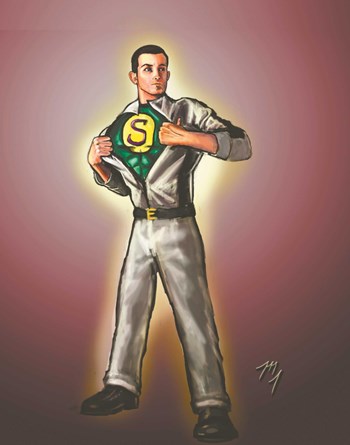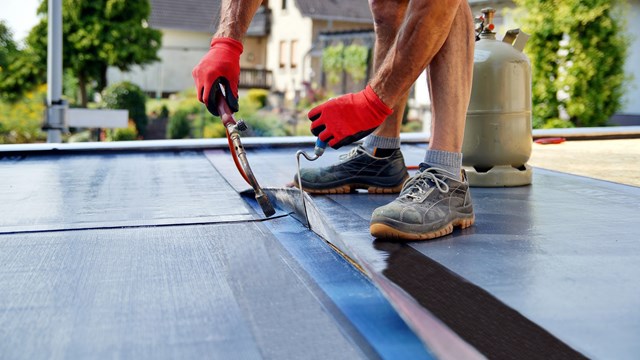
The co-op we owned was a huge brick pre-war building. Three of its sides were either attached to other buildings or sealed off by high barbed-wire fencing. The only way into the building was the front door, and that meant going through the lobby—right past the super’s apartment.
The super, a tall youngish man with tattoos on his arms from his days in the Serbian military, had an almost preternatural ability to detect suspicious noise in the lobby. Slam a door by mistake and—poof!—he would appear, making sure everything was OK.
One night, a drug addict tried to sneak into the building to sleep in the lobby. The super was having none of it. When the intruder refused an order to leave, the super picked the guy up bodily and literally threw him out, just like they do on TV cop shows. Our building was like a fortress, and our super kept it safe. That was one of his many jobs, and he did it with aplomb.
Super Skills
What makes a good super? According to some experts, two skill sets that are not often found in the same person. “They need two primary skills,” says Michael Pratico, Jr., of Richardson Commercial Realty, located in the Hamilton-Trenton area. First, “they need to be a decent mechanic—meaning they can fix a doorknob and do minor repairs on the boiler.”
The second skill might not initially come to mind when one thinks about a super’s job description, but is perhaps the more important of the two.
“They have to be a good people person,” says Pratico. “They are often the face of the association.”
“They have to have a good temperament,” agrees Elaine Warga-Murray, chief executive officer and managing partner of Regency Management Group in Howell. “They’re in constant contact with owners and contractors.”
Generally, the super is hired by and reports to the property manager. In larger buildings, the super often has his own staff, comprised of porters, doormen, and handymen, who perform the more menial tasks, while the super focuses on larger issues and on liaising with the residents. In smaller buildings, the super does it all, from changing batteries in fire alarms to baiting the mousetraps in the basement.
“The super is the captain of the ship,” says Peter Grech, president and director of educational services with the Superintendents Technical Association, in Brooklyn. “He/she overseas and supervises all staff, all contractors.”
There are many tasks that need to be done, of course—checking equipment, cleaning, managing staff, helping shareholders with maintenance issues—but the job itself is fluid. What’s the average super’s day like?
“That would take hours,” says Grech.
Start with the basics, then—the equipment. All buildings have a heating system, and many buildings have central air conditioning. The super’s role begins with these pieces of equipment, and experience in those areas are what managing agents look for when hiring supers.
The two main jobs, Pratico says, are “being that go-to person for residents and general repair requests, and being the facilitator for a person who performs regular, routine maintenance issues.”
This involves cleaning filters, checking boilers, keeping track of temperatures throughout the building to make sure the heating system works, and making sure there are no leaks.
“Changing bulbs, unclogging sinks, tubs and toilets, changing a light switch, changing washers are all standard stuff,” says Grech. This varies from building to building.
“Every building has core designs and core needs, but there are differences, and it’s these differences that make a building unique,” says Grech. “Therefore no generic job description can do. Each building has to make its own job description.”
If the super is captain of the ship, he is also director of homeland security.
“The prime obligation to residents by a super is to provide a safe (fire, health, security) building where people can live,” says Grech.
Training
Many organizations offer training and certifications for the technical aide of the job.
“A superintendent should have some sort of certification from an established source,” says Grech, mentioning some local real estate organizations and property management schools and professional organizations like the Institute of Real Estate Management (IREM). “Degrees from technical schools also help.”
Knowing how to perform the tasks—or whom to call for help if tasks are beyond the scope of the super—are essential to the job. But a good super is also a people person, and needs good people skills. Supers manage staff, and they also deal with the residents.
“Technical skills are important but so are people skills, such as calling people back fast, or dealing with issues even if they may not be part of the super’s job description,” says Grech, who is a super himself. “We are the go-to guy for residents, and as such we need to offer help, guidance and opinions when asked.” Pratico agrees.
“The reality is, supers are go-to people for things that come up that no one knows who else to go to with,” he says. “They end up being a catch-all. Consequently, they are pulled in many different directions. This is exacerbated by the fact that they often live on site.”
Dealing with this pull is a key element of the job.
“They have to be able to be interrupted without being distracted,” says Warga-Murray. “Some supers just go all over the place. They don’t finish what they were doing or what they are supposed to do.”
Indeed, many supers live in the buildings and complexes they manage. This makes it difficult to separate the work environment from the home environment, and difficult to relax.
“There’s lots of pressure, lots of stress, and not much gratitude,” says Pratico. “I wouldn’t want the job.”
Warga-Murray says, “Supers are hard to find, and hard to keep.”
Supers who are looking for additional training would do well to take classes dealing with the personal side of the job.
“I would strongly recommend a super to take a psychology class or two,” says Grech. “We do deal with people. You know, when a pipe breaks down you can fix it or call a plumber. Same can be said about a switch boiler. But when the problem is the resident, who do you call?”
Talk It Out
A good super is always available to talk to residents in case of trouble. There is a line between what constitutes an emergency and what doesn’t, of course. While specific duties are often outlined in governing documents, or in the agreements with the property managers, the gray area is vast.
In Building A, for example, the super might not be expected to change light bulbs, as per the documents. But is that an absolute rule? And does it matter if it is violated?
“These people forge relationships with the residents,” says Pratico. “They become friends. How do you say no to a 78-year-old woman who wants you to change her light bulbs?”
Supers take on their job requests in different ways, depending on the size of the building and his preferences.
“Stopping the super in the hallway on his way to a job is not the best way as most likely he will forget, and then the resident will get pissed off,” says Grech. Get it in writing, he suggests.
“E-mails are great. Phones calls unless they are emergencies are nothing more than a pain. Notes are good too. Any way you look at it, a note, an e-mail or work order, when it’s in writing, we have a record of it, and can’t forget,” says Grech.
How do you know how to best put in a request?
“The best advice is, ask your super,” says Pratico.
Communication is key, especially in dealing with the board and the property managers.
“Some supers retain information because they think it helps them retain their job,” says Warga-Murray. “But I find that supers [that] are more open and more communicative stay in their jobs longer. Supers who don’t share information scare boards.”
Communication is key for the super, but it’s key for residents, too. It’s obviously in the interests of the residents to be nice to the super, but not everyone is. Sometimes they see him as an indentured servant rather than a human being.
“When it’s after hours, unless it’s urgent, residents should talk to the super about anything other then about the building or about an issue that resident has,” Grech advises. “Supers are people. You will find the most supers have many interests and are intelligent and too many people just think of a super as the guy who fixes things.”
We always gave our super a bottle of wine for the holidays, and took time to chat him up when we saw him in the hallway. In return, he provided us with a safe, clean, well-run building. An equal exchange.
“Get to know your super,” says Grech.
Greg Olear is a freelance writer and a frequent contributor to The New Jersey Cooperator.






Leave a Comment